Key takeaways:
- Cannabis reparations should focus on holistic healing by providing access to legal markets, job opportunities, and community support, rather than just financial compensation.
- Legalization of cannabis offers economic opportunities and seeks to rectify injustices associated with previous prohibition laws that disproportionately affected minority communities.
- A future framework for cannabis reparations must prioritize educational programs, expungement of criminal records, and community empowerment to ensure lasting change.
- Involving communities in shaping cannabis policy is crucial to address historical injustices and promote transparency and accountability in the industry.
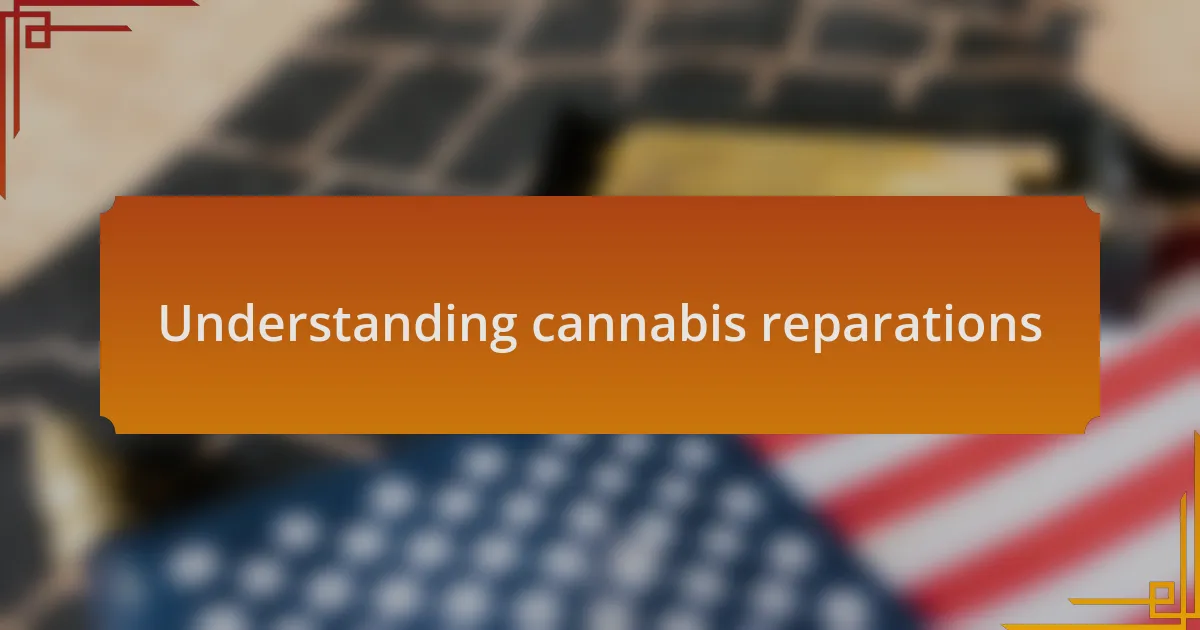
Understanding cannabis reparations
Cannabis reparations invite us to consider the deep roots of injustice within the context of cannabis prohibition. Reflecting on my own experiences, I often find myself pondering how simple possession can lead to life-altering consequences for so many individuals. Isn’t it time we acknowledge the harm this has caused to entire communities?
Some people equate reparations with just financial compensation, but it’s much more nuanced. I remember discussing this topic with a friend who was affected by past drug laws, and she pointed out that healing also involves access to legal markets, job opportunities, and fair representation in the industry. It’s a bittersweet realization; reparations aim to mend both the social fabric and personal lives tarnished by unfair cannabis laws.
Understanding cannabis reparations means recognizing the broader social impacts of criminalization. When I see stories of individuals who’ve faced severe penalties for non-violent offenses, it stirs a sense of urgency within me. How can we rebuild what was unjustly taken from them? It’s essential to work toward a framework that not only addresses past wrongs but also fosters a fair and equitable future for all.
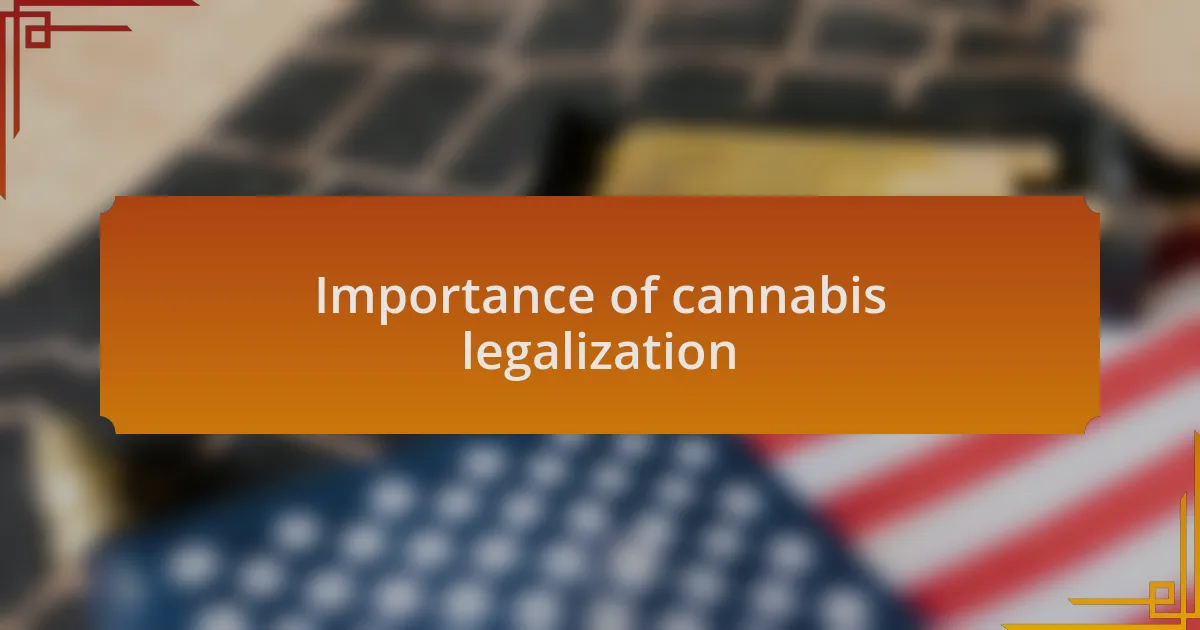
Importance of cannabis legalization
The importance of cannabis legalization goes beyond personal choice; it signifies a shift in societal norms and values. From my observations, legalizing cannabis can help dismantle the stigmas surrounding it, paving the way for open discussions about its benefits and risks. I often wonder how many lives could be positively transformed if we normalized conversations about cannabis, making it just another aspect of health and wellness.
Moreover, legalization creates economic opportunities that previously didn’t exist. In my community, I’ve seen small businesses thrive as they enter the legal cannabis market, creating jobs and boosting local economies. Isn’t it fascinating how something once deemed harmful can now fuel entrepreneurial efforts and innovation?
Finally, legalization holds the potential to rectify some of the injustices tied to cannabis prohibition. I reflect on the countless individuals, including friends and family, who faced disproportionate penalties for simple possession. When we think about cannabis legalization, it becomes clear that this is not just about access to a plant; it’s about justice, equity, and healing. How can we fully embrace this new era while also honoring those who have suffered in the past?
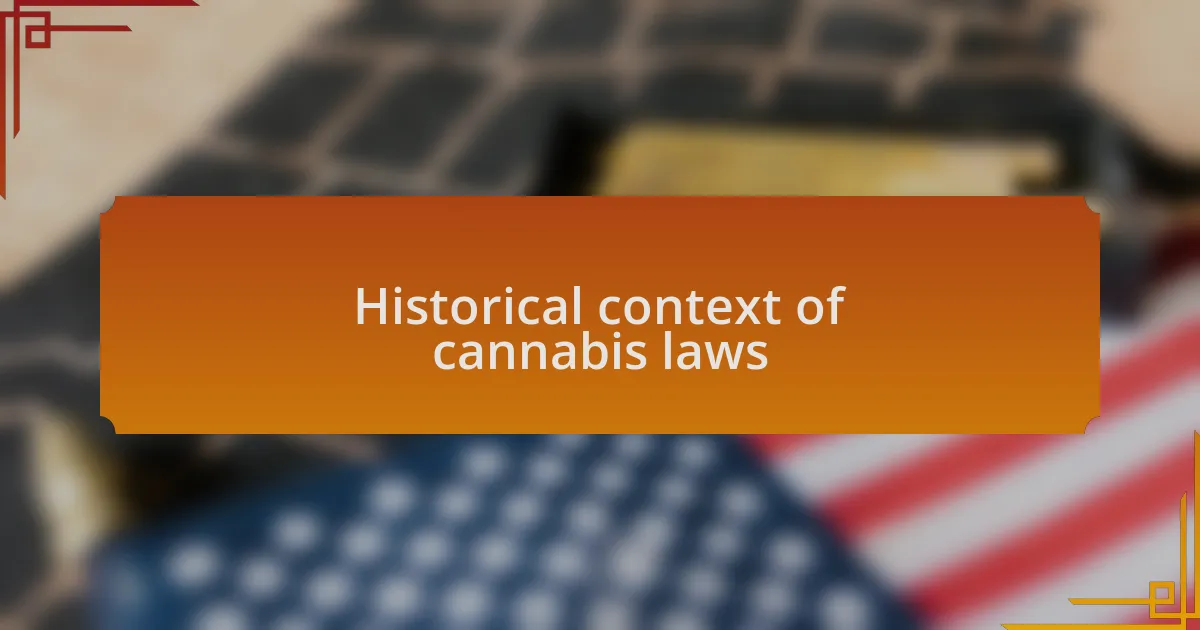
Historical context of cannabis laws
Cannabis laws have continually evolved since early 20th century prohibition, influenced by shifting social and political landscapes. I remember studying the early stigmatization of cannabis in my history classes, where I learned about the role of fear tactics and racial prejudices that fueled its criminalization. Can you believe that in the 1930s, misinformation led to the Marijuana Tax Act, which effectively banned cannabis nationwide?
Fast forward to the 1970s, when the Controlled Substances Act categorized cannabis alongside dangerous drugs, solidifying its illegal status. This period marked an era of mass incarceration disproportionately affecting minority communities—something I can’t help but feel a deep sense of injustice about. Reflecting on those laws, I often ask myself: How did we allow misinformation to dictate someone’s freedom and future?
In recent years, the tide has turned as public opinion shifts towards legalization and decriminalization, igniting crucial discussions about reparative justice. It’s heartening for me to see states not only legalizing cannabis but also integrating social equity measures aimed at communities harmed by previous laws. How can we reconcile these advancements with the historical injustices, ensuring it does not happen again?
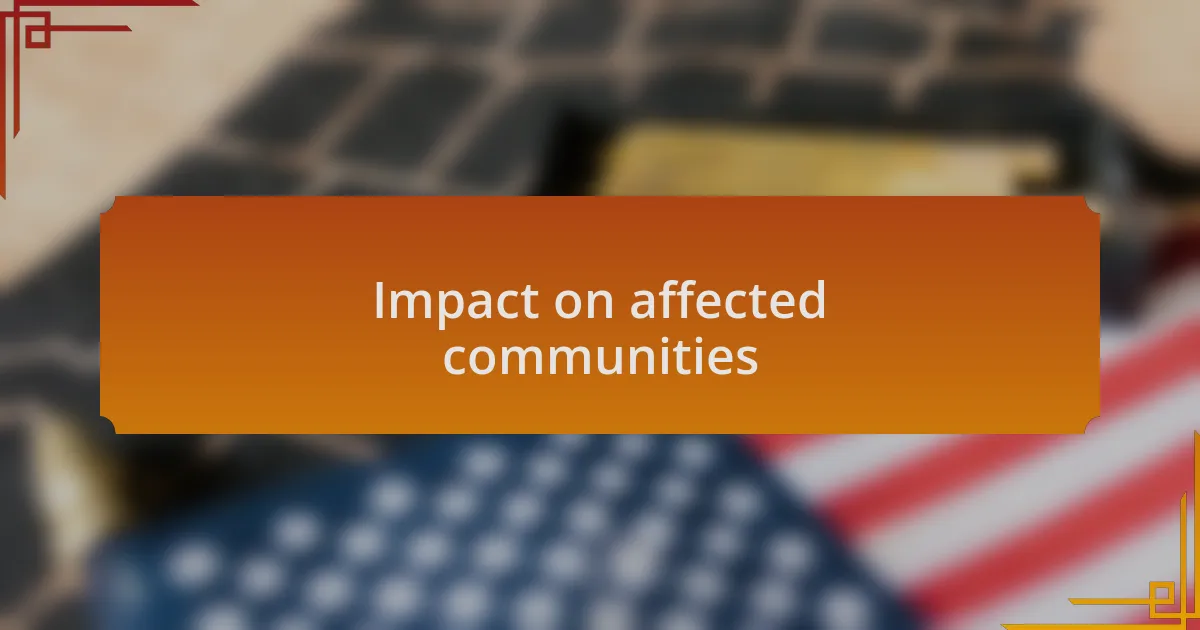
Impact on affected communities
The impact of cannabis prohibition on affected communities has been profound and lasting. I recall hearing stories from friends who grew up in neighborhoods heavily targeted by law enforcement due to cannabis laws. These lived experiences highlight the detrimental effects of criminal records, which often act as barriers to employment and housing. How can we expect individuals to thrive when their past mistakes, often criminalized due to unfair laws, follow them like shadows?
Moreover, the economic ramifications for these communities are staggering. I was genuinely shocked to learn that areas with high rates of cannabis-related arrests often experience limited access to education and health resources. It’s heartbreaking to think that a simple plant could contribute to a cycle of poverty and disenfranchisement that holds families back for generations. What kind of future can we envision for those communities if we don’t address these issues directly?
In recent years, there have been efforts to redirect some of the tax revenue from legalized cannabis into these very neighborhoods to help rectify past wrongs. I often wonder if these reparative measures are enough to mend the deep wounds caused by decades of systemic injustice. Genuine equity and empowerment within these communities require more than financial support; they need recognition, respect, and an opportunity to rebuild. What do you think it would take for true healing to begin?
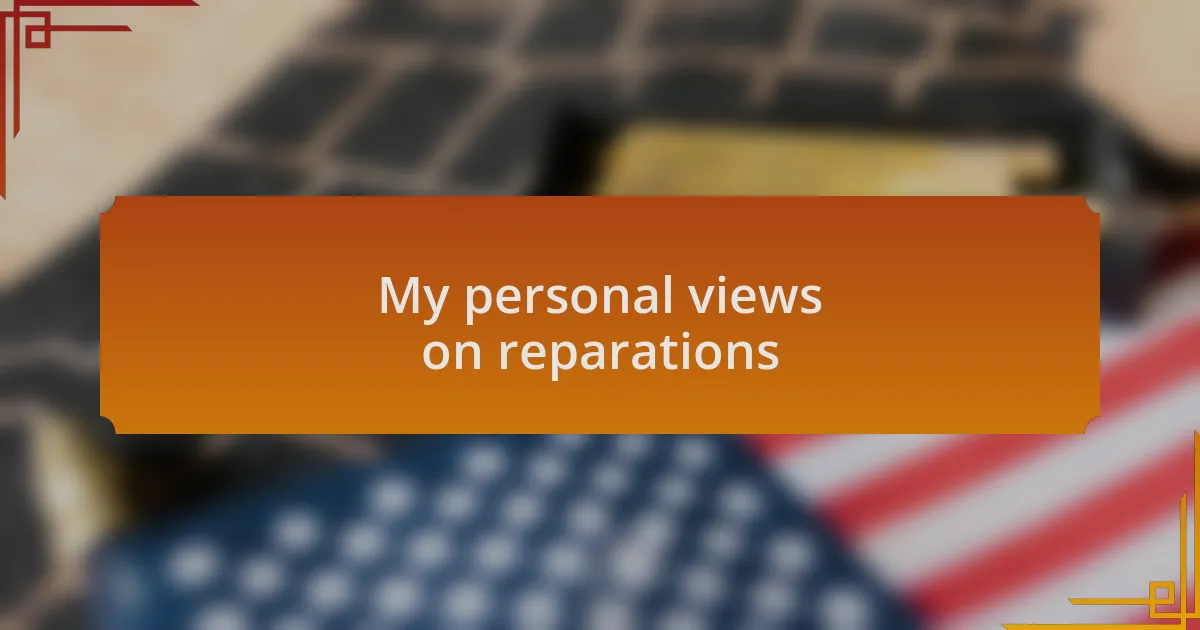
My personal views on reparations
Reparations, in my view, should go beyond just financial compensation. From what I’ve seen, efforts to provide access to education and mental health services can be just as vital. How can we genuinely facilitate healing without addressing the holistic needs of communities that have suffered so much?
I often think about the resilience of those affected. I’ve met individuals who, despite their backgrounds, are working tirelessly to uplift their communities through grassroots initiatives. It makes me question, how do we honor their efforts authentically? Support should involve a collaborative approach, where the voices of those with lived experiences shape the direction of reparative actions.
Ultimately, reparations are about restoring dignity. I can’t help but feel that without acknowledgment of the pain and struggle rooted in cannabis prohibition, any financial gesture will fall flat. What truly matters is fostering a sense of belonging and trust within these communities. Isn’t that the essence of what reparations should be about?
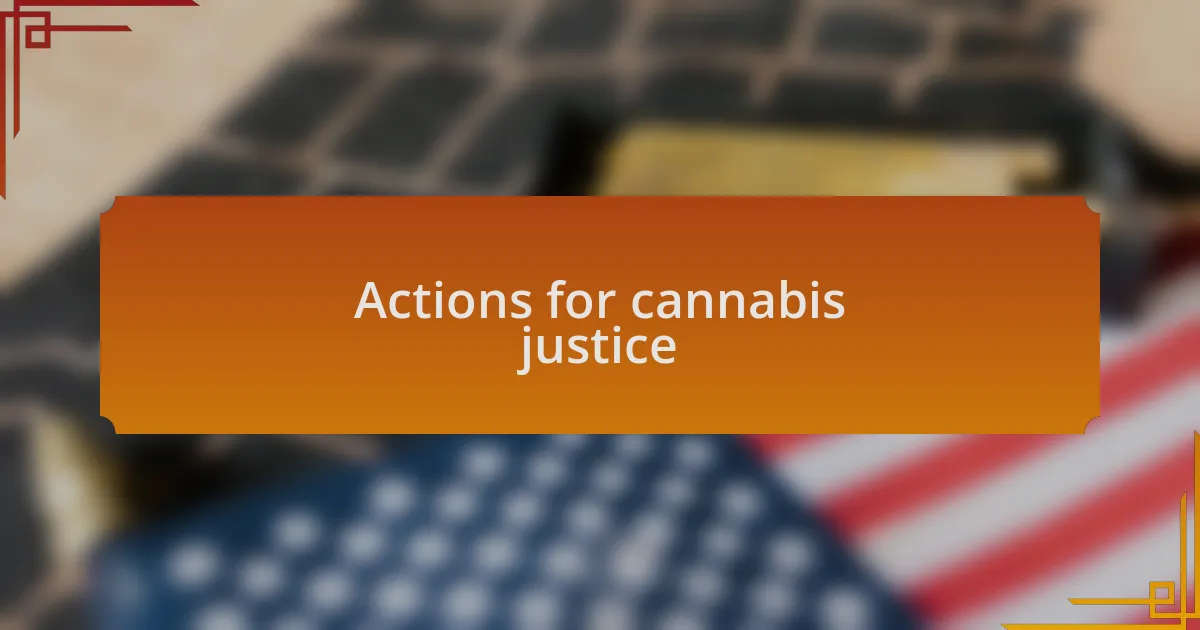
Actions for cannabis justice
Addressing cannabis justice requires concrete actions that go beyond symbolic gestures. Personally, I believe implementing expungement programs for past convictions is a crucial step. This not only removes the stigma associated with criminal records but also allows individuals the chance to rebuild their lives. Have you ever seen how a simple change in legal status can open up new opportunities for someone? It’s transformative.
Moreover, equitable access to the cannabis industry is essential. I’ve met aspiring entrepreneurs from impacted communities who possess immense potential but face significant barriers to entry. When I listen to their stories, I can’t help but feel that providing resources like funding opportunities and mentorship could truly level the playing field. Isn’t it powerful to think about how these actions could cultivate a new generation of business leaders?
Lastly, investing in community programs that focus on health and wellness can make a profound impact. I recall a conversation with a local advocate who emphasized the need for mental health resources specifically tailored for those affected by the war on drugs. It got me thinking—how can we ignore the mental scars left behind? The healing process must include addressing these concerns, as they are intertwined with the broader narrative of cannabis justice.
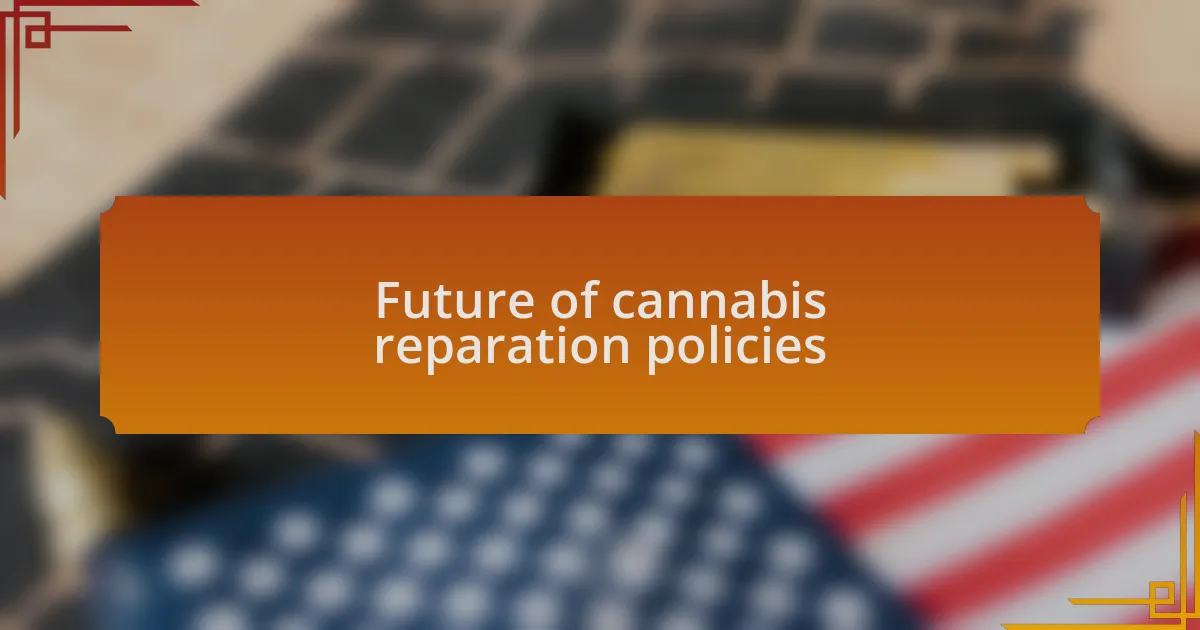
Future of cannabis reparation policies
As we move toward the future of cannabis reparation policies, I find myself optimistic but cautious. It’s essential to recognize that reparations should not only address financial injustices but also include support for community development. Reflecting on conversations I’ve had with community leaders, I’ve learned that no amount of money can replace the lost opportunities and generational trauma caused by the war on drugs. Isn’t it time we offer more than just monetary compensation?
In my experience, we need to prioritize educational programs that empower individuals with knowledge about cannabis benefits and business practices. During a recent workshop I attended, it became crystal clear how knowledge can uplift a community—sharing stories of success inspired attendees to envision themselves as future leaders in the cannabis space. How can we harness this energy? By creating pathways that lead to real ownership and participation in this industry, we can create a legacy of empowerment.
Furthermore, I believe future policies must emphasize transparency and accountability. It’s disheartening to see that, despite the changing legal landscape, many communities still feel disconnected from the benefits of cannabis legalization. In talking with several individuals affected by previous cannabis laws, the consensus is loud and clear: they want to see systemic change that includes their voices in shaping these policies. Wouldn’t it be more just if those directly impacted could directly influence the reforms designed for them?